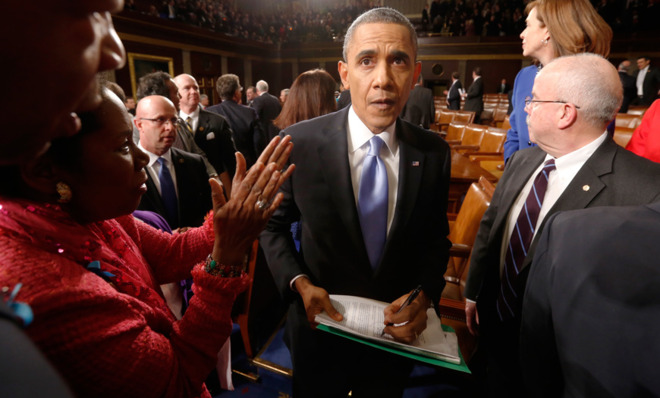Is Obama's new retirement plan a federal bailout waiting to happen?
A decent, no-risk return? Sounds risky.

A free daily email with the biggest news stories of the day – and the best features from TheWeek.com
You are now subscribed
Your newsletter sign-up was successful
In the State of the Union address last night, President Obama announced MyRA, a new program — initiated by executive order — to help Americans whose employers don't provide a retirement account.
According to a 2009 report by the Brookings Institute, about half of American workers are employed by companies that don't offer retirement plans. So this is clearly a program aimed at solving a real problem. But (of course) there's risk.
Here's what Obama said:
The Week
Escape your echo chamber. Get the facts behind the news, plus analysis from multiple perspectives.

Sign up for The Week's Free Newsletters
From our morning news briefing to a weekly Good News Newsletter, get the best of The Week delivered directly to your inbox.
From our morning news briefing to a weekly Good News Newsletter, get the best of The Week delivered directly to your inbox.
Let's do more to help Americans save for retirement. Today, most workers don't have a pension. A Social Security check often isn't enough on its own. And while the stock market has doubled over the last five years, that doesn't help folks who don't have 401ks.
That's why, tomorrow, I will direct the Treasury to create a new way for working Americans to start their own retirement savings: MyRA. It's a new savings bond that encourages folks to build a nest egg. MyRA guarantees a decent return with no risk of losing what you put in. And if this Congress wants to help, work with me to fix an upside-down tax code that gives big tax breaks to help the wealthy save, but does little to nothing for middle-class Americans. Offer every American access to an automatic IRA on the job, so they can save at work just like everyone in this chamber can. [The White House]
Of course, trying to help the poor and middle class save for retirement is a noble ambition. But where's the "decent return with no risk" going to come from?
At this point, we don't know too many details about MyRA (more information is slated to be released today), but the White House has said it would be offered in the form of Roth IRA accounts. Roth IRAs allow you to put after-tax income into investments in securities, like stocks and bonds, typically via mutual funds. But other investments — like derivatives and real estate — can also be employed. The money in a Roth IRA grows tax free.
Who is going to manage the money put into these MyRA accounts to deliver a "decent no-risk return"? Investment managers appointed by the Treasury? Then there's a risk they won't make a decent return to give back to investors. There's also a risk that they could lose money.
And if they don't make a return to deliver to investors? The "no risk return" sounds like a Federal guarantee, which is fine for people putting their money in. But what about those who will have to pick up the bill if this scheme has to be bailed out to ensure that the "no risk return" is delivered as promised?
A free daily email with the biggest news stories of the day – and the best features from TheWeek.com
For this scheme to work, rules need to be in place to prevent leaving the taxpayer on the hook, and requiring a Federal bailout. The safest strategy would be to mandate that investors' money is only invested in government securities, the repayment of which is guaranteed by the 14th Amendment to the Constitution. But that won't yield much return, at least compared to other possible investment strategies.
On the other hand, a (hopefully temporary) bailout may not be a disaster, especially not when compared to investors losing their money altogether. The bailout of Fannie Mae and Freddie Mac — while controversial at the time — is actually coming to close being paid back in full, meaning taxpayers will soon be off the hook.
In light of that, the possibility of future taxpayer bailouts may be a risk that Obama is willing to take in order to fulfill his objective of helping the poor and middle class save for retirement.
Editor's note: This article has been revised since it was first published in order to more clearly include proper attribution to source material.
John Aziz is the economics and business correspondent at TheWeek.com. He is also an associate editor at Pieria.co.uk. Previously his work has appeared on Business Insider, Zero Hedge, and Noahpinion.
-
 James Van Der Beek obituary: fresh-faced Dawson’s Creek star
James Van Der Beek obituary: fresh-faced Dawson’s Creek starIn The Spotlight Van Der Beek fronted one of the most successful teen dramas of the 90s – but his Dawson fame proved a double-edged sword
-
 Is Andrew’s arrest the end for the monarchy?
Is Andrew’s arrest the end for the monarchy?Today's Big Question The King has distanced the Royal Family from his disgraced brother but a ‘fit of revolutionary disgust’ could still wipe them out
-
 Quiz of The Week: 14 – 20 February
Quiz of The Week: 14 – 20 FebruaryQuiz Have you been paying attention to The Week’s news?